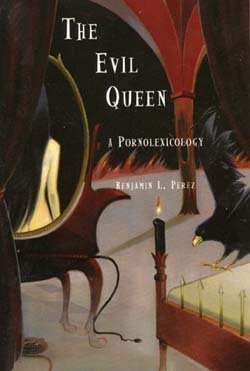
|
The Evil Queen Reviewed by Jean Roberta |
||
 This unusual book, organized as a dictionary, is also a kind of episodic fantasy novel about the relationship of a dwarf eunuch (?you?) and his Mistress, the Evil Queen. Several other reviewers have described this book as a unique writing experiment, but writers (like other people) have ancestors or role models, and all writing is part of a cultural tradition. This unusual book, organized as a dictionary, is also a kind of episodic fantasy novel about the relationship of a dwarf eunuch (?you?) and his Mistress, the Evil Queen. Several other reviewers have described this book as a unique writing experiment, but writers (like other people) have ancestors or role models, and all writing is part of a cultural tradition.
This book does indeed have roots, and the historical references in it seem like deliberately-planted clues to their identity. Benjamin Perez seems to be following in the cloven-hoofprints (the logo of the publisher of this book, Spuyten Duyvil) of an earlier American writer, Ambrose Bierce, in suggesting that words can excite and corrupt the reader. The Devil?s Dictionary is Bierce?s collection of witty definitions, originally written for his column in Wasp magazine (1881-1887). In that book, the word ?dictionary? itself is defined: ?Dictionary, n. A malevolent literary device for cramping the growth of a language and making it hard and inelastic. This dictionary, however, is a most useful work.? The mysterious disappearance of Ambrose Bierce in Mexico in 1914 enhanced his literary image as one who knew the Devil better than most of his contemporaries. In The Evil Queen, Perez modestly quotes an earlier lexicographer, Samuel Johnson, the Englishman who compiled the first modern English dictionary in 1755: ?Dedication: Every other author may aspire to praise; the lexicographer can only hope to escape reproach.? This dedication may originally have been Johnson?s reference to the complaint made by a lady of his acquaintance that his dictionary contained too many ?bad? words. (She must have been looking for them.) As though in response to the widespread belief that vulgar words (like criminals or homeless people) should be kept somewhere out of the social mainstream, Perez?s Evil Queen explains the difference between ?foul language? and ?fair speech? in a section named ?Euphemism:? ?She is a banshee running through the castle. (Screeech!!!) And the name of God can never be spoken, no doubt the source of all obscenity!? Throughout the book, the Evil Queen (the author?s alter ego) delights in suggesting that the sacred and the profane are closely related, or even identical. As a former student of Religious Studies, Perez knows about the tangled history of Western religion. He keeps the reader off-guard by claiming that Good is Bad, and vice versa. The Evil Queen is described as inhuman. She is ?skeleton-white? with ?Bible-black? hair, and she has ten clitorises strategically placed on her body. At eight feet tall and one hundred pounds, she seems like a caricature of current beauty standards (?a woman can never be too thin?) as well as the Scarlet Whore of Babylon. (She loves everything red: roses, tomatoes, wine, blood.) The Evil Queen is so fascinating that the little man (one foot tall) called ?you? is pleased to serve her even after she castrates him. The Evil Queen and ?you? (why is he her only servant?) have complementary Dominant/submissive personalities. She beats him for disobeying her, and he screams his repentance, but he disobeys over and over. These two characters, who resemble X-rated cartoons, are more convincing as symbols than as human beings. They enjoyably torment the proudly intellectual reader or reviewer (naming no names) who wants to find logical patterns in their story. By whose standards is the Evil Queen evil? Among other things, she seems to be a feminist warrior. The author shows how women have been oppressed and massacred by male authorities who have feared their sexuality and their inherent power. The feminist reforms of the nineteenth century are described with admiration. The Evil Queen grieves for the Virgin Mary as the archetype of woman as victim: ?Pity Mary, Saint of Rape, The reader might guess that the Evil Queen has grown in power as women have acquired some political rights. However, the dwarf narrator, her faithless servant, writes to her lover Mephistofeles to report that the Evil Queen has predicted her own demise: ?Europe, finally, after her long struggle, will be civilized. I will have no place.? The dwarf proposes to Mephistofeles: ?I must replace the Evil Queen. I need your help. I cannot do it without you. You granted power to the Evil Queen on her first menstruation, you will grant power to me on my first erection.? Eventually, the dwarf binds the unresisting Evil Queen to her own bed, breaks her fingers and toes, gouges out her eyes, then takes her to her own dungeon where he tortures her further, dismembers her and eats her flesh in a kind of unholy communion. As a result, he grows into an eight-foot-tall man with a gigantic cock. Does this transformation represent male domination of the world in our time? Who knows? In the definition of ?apostasy/heterodoxy,? we are told: ?The heresies of the past are the orthodoxies of the present. . . The founders and reformers of true religion were first and foremost heretics (Jesus, Muhammad, Luther). Heresy is orthodoxy in disguise. Orthodoxy is heresy in disguise.? So apparently, good and evil are in the eyes of the beholder. In a mandatory ?Psycho-Sexual Self-Evaluation,? the reader is questioned and told that a score of over 245 points means that one is perverted, while a lower score means that one is repressed. No one escapes judgment in the imaginary world of The Evil Queen. But it?s well worth the price of admission. |
||
|
|